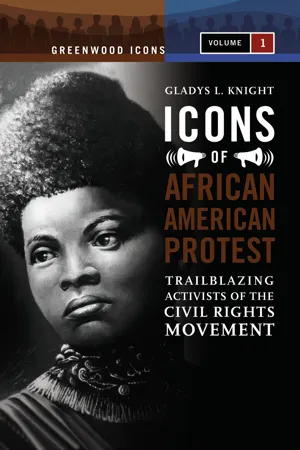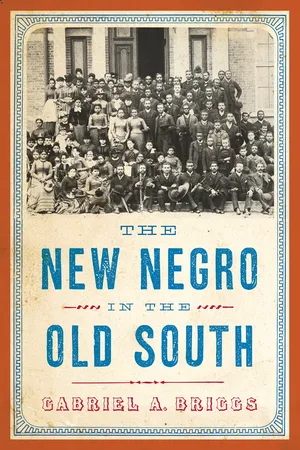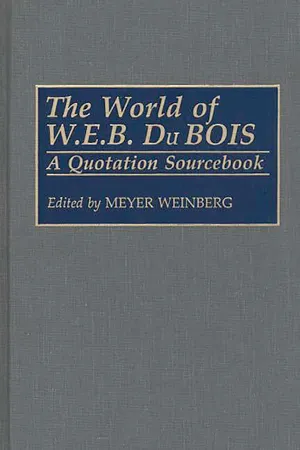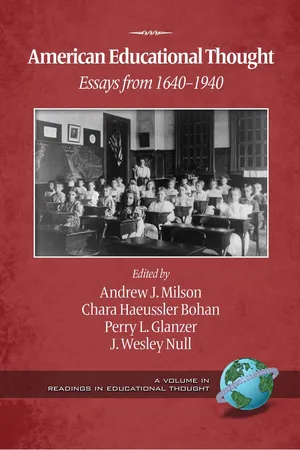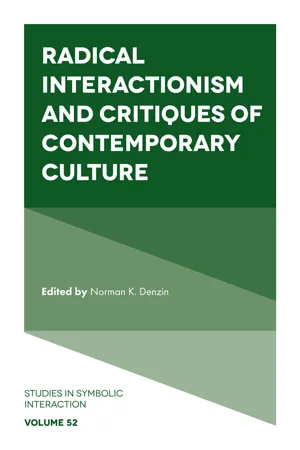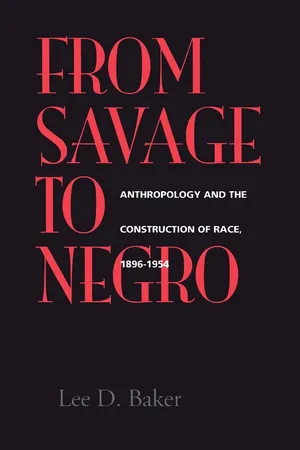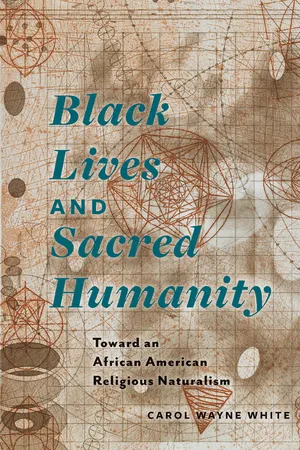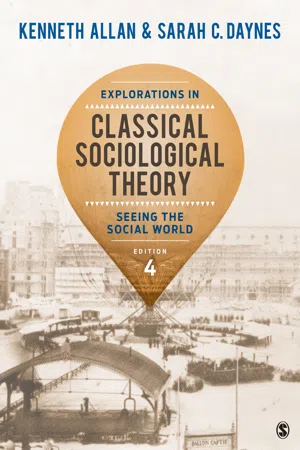Social Sciences
W. E. B. Du Bois
W. E. B. Du Bois was a prominent African American sociologist, historian, and civil rights activist. He co-founded the National Association for the Advancement of Colored People (NAACP) and was a leading figure in the fight for racial equality and social justice. Du Bois's influential writings, including "The Souls of Black Folk," addressed issues of race, discrimination, and the African American experience in the United States.
Written by Perlego with AI-assistance
Related key terms
1 of 5
12 Key excerpts on "W. E. B. Du Bois"
- eBook - ePub
Sociology and Military Studies
Classical and Current Foundations
- Joseph Soeters(Author)
- 2018(Publication Date)
- Routledge(Publisher)
6 W. E. B. Du Bois Race, diversity and inclusion, in society and the militaryW. E. B. Du Bois (1868–1963) has been proclaimed to be ‘the first sociologist of race’, and even though race relations in earlier times were much worse than they seem to be today, it may be safe to say that race continues to be a problem in societies all over the world (Nkomo, 2009). There are many examples to underline this contention. The racial background of many of today’s tensions between the population and the police – in the USA and elsewhere – is just one of them. In the armed forces this may not be different, although Charles Moskos and others have contended that the US military organization works as a ‘race equalizer’, providing social mobility to African-American personnel that was absent in other sectors for too long. Even so, there is a long history of painful – and hopeful! – events since multi-racial integration began to develop in the military, in the USA and certainly also elsewhere in the world.But first, let’s turn to the life and works of W. E. B. Du Bois himself (e.g. Blackwell and Janowitz, 1974; Nkomo, 2009; Morris and Ghaziani, 2005; Morris, 2015). At the end of the nineteenth century Du Bois was among the first scholars in the USA to start working on something called sociology. Trained in the humanities and history in particular, he soon developed a penchant for modern social sciences, including the accompanying methodologies. This change in professional orientation was enhanced by his two-year stay in Berlin, where he studied under Gustav Schmoller and other famous professors and where he became a friend of Max Weber. He maintained friendly relations with Weber until the latter’s untimely death in 1920; during this friendship he influenced Weber’s thinking about race and ethnicity (Morris, 2015: 149–167). - eBook - PDF
Icons of African American Protest
Trailblazing Activists of the Civil Rights Movement [2 volumes]
- Gladys L. Knight(Author)
- 2008(Publication Date)
- Greenwood(Publisher)
W.E.B. Du Bois (1868–1963) Library of Congress W.E.B. Du Bois was a prominent scholar, intellectual, writer, and editor. Born and raised in a predominantly white community in the North and edu- cated at Fisk (a leading historically black university in the South), Harvard (a predominately white Ivy League university), and the prestigious Univer- sity of Berlin in Germany, Du Bois was a prodigy among African Americans in the early twentieth century. He utilized his talents and influence to com- bat racism, segregation, and anti-black violence and promote the advance- ment of African Americans. Du Bois helped organize and participated in organizations such as the African American Council and the Niagara Move- ment. The National Association for the Advancement of Colored People (NAACP) was his greatest undertaking, and as editor of its organ, The Cri- sis, Du Bois became the foremost agitator, influential thinker, and commen- tator of his time. Through the written word—sociological studies, essays, articles, and books—Du Bois expressed himself freely, breaking down the Negro Problem and its various solutions, and displaying unprecedented knowledge of the social conditions, history, and culture of African Americans. He also lashed out with sharp criticism. His prolific and seminal writing reflected a com- plex man who espoused a broad array of methodologies. Among these were his advancement of the Talented Tenth, black self-defense, black capitalism, integrationism, Pan-Africanism, socialism, and communism. Above all else, he was unapologetically controversial. With the worsening of conditions for African Americans, Du Bois became progressively more radical and disillusioned, to the point that he moved to Ghana in 1961. Two years later, he renounced his American citizenship. On August 27, 1963, he died at the age of ninety-five. - eBook - ePub
- Gabriel A. Briggs(Author)
- 2015(Publication Date)
- Rutgers University Press(Publisher)
3. Soul Searching: W. E. B. Du Bois in the “South of Slavery”The white south is the most reactionary modern social organization which exists today in the civilized areas of the world. —W. E. B. Du Bois, “Ho! everyone that thirsteth,” May 26, 1958, W. E. B. Du Bois Papers, MS 312, Special Collections and University Archives, University of Massachusetts Amherst LibrariesWilliam Edward Burghardt Du Bois epitomized the qualities that would come to be called the New Negro, and the fact that some of his major work antedates the consolidation of that concept is evidence that his work was as influential as it was prescient. He was born in Great Barrington, Massachusetts, on February 23, 1868. At just fifteen Du Bois began an intellectual career that spanned nearly a century. After graduating as valedictorian from Great Barrington High School, he attended Fisk University in Nashville, where he completed his Bachelor of Arts degree in 1888. Du Bois then returned to Massachusetts, where he earned another bachelor’s (1890) and a master’s degree (1891) from Harvard. Following two years in which he studied at the University of Berlin (1892–94), he became the first African American to earn a PhD at Harvard (1895), with his dissertation, “The Suppression of the African Slave Trade to the United States of America, 1638–1870.”1Du Bois held a number of teaching appointments during his lifetime. His first experience was at Wilberforce University in Ohio, where he taught for two years while completing his doctoral dissertation. His second appointment was at the University of Pennsylvania (1896–97), where his proximity to African American urban residents facilitated his much-lauded sociological study The Philadelphia Negro (1899).2 Du Bois again traveled south in 1897 to accept a position at Atlanta University, where he taught history and economics for thirteen years, during which time he published numerous articles and book manuscripts on African American life, including his best-known work, The Souls of Black Folk, published in 1903.3 After many years in New York he returned to Atlanta University in 1934, where he spent a decade as the department chair of sociology. Among the highlights from these years were his publication of Black Reconstruction in America, 1860–1880 and his creation of the academic journal Phylon (1940).4 - eBook - PDF
The World of W.E.B. Du Bois
A Quotation Sourcebook
- Meyer Weinberg(Author)
- 1992(Publication Date)
- Greenwood(Publisher)
Page 1 Introduction W.E.B.Du Bois stands preeminent among intellectuals of the United States in this century. None wrote more of enduring importance or continues to be as relevant for our own day. Equally significant, Du Bois was an activist intellectual—he organized, protested, laid out programs, petitioned, and raised questions of longterm strategy and shortterm tactics. He mastered numerous forms of written expression: detailed scholarly investigations superior to many accepted models of research; vast investigative designs, stretching in one case over a century; editing of periodicals dealing more popularly with problems of the contemporary world; articles in learned and topical media; and sustained illumination in a new light of persistent issues ranging from the Reconstruction period of United States history to the relatively brief career of racism in world history. He was also a commanding speaker. To study his life and writings is simultaneously to study African American history. His published works and his correspondence are about and of that history. But these are also part of the general history of the United States. Du Bois wrote a great deal with white Americans in mind. He did not strive only to free blacks from oppression; he also worked to warn all Americans that democracy for them was equally endangered by racism. The major subjects of his writings range widely. Black people in the United States and the world were the foundation upon which the rest was built. He once wrote an essay contending that black colleges should start their curricula with special attention to black life and history. Then, the span of study should be broadened to include all of world civilization. This was, in fact, how Du Bois’s own thought progressed. To study blacks alone was not to do justice to the broad humanity of all blacks and of others. Black history from Africa forward appears throughout his writings. - eBook - ePub
Confrontational Citizenship
Reflections on Hatred, Rage, Revolution, and Revolt
- William W. Sokoloff(Author)
- 2017(Publication Date)
- SUNY Press(Publisher)
Even though Du Bois seems to prefer moderate approaches to correcting the race problem in America, Du Bois as time went on gravitated to revolt as a way of life as a call to explore all available options for social, political, and economic transformation to improve race relations. 11 W.E.B. Du Bois Born in Great Barrington, Massachusetts, on February 23, 1868, William Edward Burghardt “W.E.B.” Du Bois was an academic, activist, historian, poet, sociologist, and pan-Africanist who dedicated his life to fighting for people of color. Du Bois attained a classical liberal arts education at Fisk University, continued his education at Harvard University, where he was mentored by William James, and then Du Bois studied in Berlin at Humbolt University. For his entire life Du Bois continued to study, write, and fight for people of color positioned at the bottom of the social order. Du Bois had a long and distinguished teaching career, and he was also constantly engaged with progressive political movements. He taught at Wilberforce University, Atlanta University, and joined the Niagra Movement. In 1910, Du Bois joined the NAACP and became editor of its magazine, The Crisis. Du Bois received the International Peace Prize and Lenin Peace Prize. Since Du Bois was denied a passport by the US government (1952‒58), he could not travel abroad for speaking engagements during this time. Du Bois’s intellectual accomplishments and productivity as an author were massive and reflected his evolving understanding of the role of value commitments in research, the global significance of racial problems, and opportunities for progressive social and political transformation. On August 29, 1963, Du Bois died in Accra, Ghana. Du Bois lived through the failure of Reconstruction, World War I, the Red Scare, World War II, the Depression, and McCarthyism, but never surrendered his critical voice - Edward Carson, Gerald Horne, Phillip Luke Sinitiere, Edward Carson, Gerald Horne, Phillip Luke Sinitiere(Authors)
- 2020(Publication Date)
- Routledge(Publisher)
The Scholar Denied: W.E.B. Du Bois and the Birth of Modern Sociology (Berkeley: University of California Press, 2015); Earl Wright III, The First American School of Sociology: W.E.B. Du Bois and the Atlanta Sociological Laboratory (London: Ashgate, 2016); Whitney Battle-Baptiste and Britt Rusert, eds., W.E.B. Du Bois’s Data Portraits: Visualizing Black America (Princeton: Princeton Architectural Press, 2018). Recent representative articles that advance scholarship on Du Bois, social science, education, and literature include Shirley Moody-Turner, ““Dear Doctor Du Bois”: Anna Julia Cooper, W.E.B. Du Bois, and the Gender Politics of Black Publishing,” MELUS 40/3 (Fall 2015): 47-68; Lawrence J. Oliver, “Apocalyptic and Slow Violence: The Environmental Vision of W.E.B. Du Bois’s Darkwater,” Interdisciplinary Studies in Literature and Environment 22/3 (Summer 2015): 466-484; Dan S. Green and Robert A. Wortham, “Sociology Hesitant: The Continuing Neglect of W.E.B. Du Bois,” Sociological Spectrum 35/6 (Nov/Dec 2015): 518-533; Marcus Anthony Hunter, “W.E.B. Du Bois and Black Heterogeneity: How The Philadelphia Negro Shaped American Sociology,” American Sociologist 46 (2015): 219-233; José Itzigsohn and Karida Brown, “Sociology and the Theory of Double Consciousness: W.E.B. Du Bois’s Phenomenology of Racialized Subjectivity,” Du Bois Review 12/2 (Fall 2015): 231-248; Les Black and Maggie Tate, “For a Sociological Reconstruction: W.E.B. Du Bois, Stuart Hall and Segregated Sociology,” Sociological Research Online 20/3 (2015); Michael J. Beilfuss, “Iconic Pastorals and Beautiful Swamps: W.E.B. Du Bois and the Troubled Landscapes of the American South,” Interdisciplinary Studies in Literature and Environment 22/3 (Summer 2015): 486-506; Kerry Burch, “Platonic & Freierean Interpretations of W.E.B. Du Bois’s “Of the Coming of John,”” Educational Studies 52/1 (2016): 38-50; Tommy J. Curry, “It’s for the Kids: The Sociological Significance of W.E.B. Du Bois’ The Brownies’ Books and Their Philosophical Relevance for our Understanding of Gender in the Ethnological Age,” Graduate Faculty Philosophy Journal 36/1 (2015): 27–57; Andrew J. Douglas, “W.E.B. Du Bois and the Critique of the Competitive Society,” Du Bois Review 12/1 (January 2015): 25-40; Derrick P. Alridge, “On the Education of Black Folk: W.E.B. Du Bois and the Paradox of Segregation,” Journal of African American History- eBook - PDF
- Andrew J. Milson, Chara Haeussler Bohan, Perry L. Glanzer(Authors)
- 2015(Publication Date)
- Information Age Publishing(Publisher)
American Educational Thought: Essays from 1640–1940, pages 425–447 Copyright © 2010 by Information Age Publishing All rights of reproduction in any form reserved. 425 26 Selected Writings of W.E.B. DuBois William Edward Burghardt DuBois (1868– 1963) began thinking and writing about the so- cial status of African Americans at an early age. He wrote articles for the New York Globe at age 15 and completed a doctorate at Harvard when he was 26. He was convinced that Blacks must push and agitate for social advancement to occur. He was opposed to the methods of “submission” and “adjustment” pursued by Booker T. Washington. DuBois wrote prolifi- cally and served as the editor-in-chief of Cri- sis magazine, published by the NAACP, for 25 years. His scathing editorials often provoked conflict with the NAACP leadership. DuBois grew increasingly frustrated by the persistence of racial injustice in the United States and the failure of Black leaders to be aggressive in their demands for change. He embraced radical social causes and ideologies, such as Pan-Africanism and communism, which alienated him from the mainstream. He lived in Ghana during the last years of his life and became a Ghanaian citizen shortly before his death in 1963. In the following selections, DuBois explains his views on the role of education in the social advancement of African Americans and his disagreements with the philosophy and methods of Booker T. Washington. —AJM 426 American Educational Thought: Essays from 1640–1940 Of the Training of Black Men, 1902 From the shimmering swirl of waters where many, many thoughts ago the slave-ship first saw the square tower of Jamestown have flowed down to our day three streams of thinking: one from the larger world here and over- seas, saying, the multiplying of human wants in culture lands calls for the world-wide co-operation of men in satisfying them. Hence arises a new hu- man unity, pulling the ends of earth nearer, and all men, black, yellow, and white. - Norman K. Denzin, Norman K Denzin(Authors)
- 2021(Publication Date)
- Emerald Publishing Limited(Publisher)
Musolf, 2014 ). Scholars of theoretical rationality since then have worked to universalize conceptualizations of democracy and human rights. The project of political emancipation is an unending journey. New forms of social consciousness, fresh ways to expand human rights and even the rights of other species, and brave new worlds of social justice that we cannot yet imagine await. Social structure and culture are far more egalitarian, and human rights are increasingly more universal, today than they were when the project of political emancipation began. Struggles punctuated by setbacks and turning points define the political landscape. In the United States, the standard bearers of political emancipation – the end of slavery and Jim Crow, the rise of the New Deal and feminism, and the constitutional legalization of same-sex marriage – are turning points. Many other turning points have changed history.Max Weber argued that ideas are transformative. Durkheim argued that moral individualism, the idea of the individual as a sacred object, has transformed our political system so that constitutional, social, cultural, and behavioral norms have been institutionalized that embody it. Progressives and radicals have advanced the idea that individuals deserve subjectivities and identities free from malicious construction; that desire is far from achieved. W. E. B. Du Bois's social theory has made a contribution toward that potential turning point through his formation of the concept of “double consciousness.” This concept enhances our understanding of how subjectivities of inferiority are constituted by domination and subjugation; hence, it contributes to the perspective of radical interactionism.W. E. B. Du Bois (1868–1963)
This essay lacks the space to present a biography of Du Bois or to delineate the social context of the times that influenced his writings. It is limited, instead, to exploring Du Bois's concept of double consciousness expounded in The Souls of Black Folk, originally published in 1903. Inferences from the concept will allow me to reflect on the repercussions of racialization, meritocracy, and the subjectivity struggles embedded in self-formation, consequences of living life in a social structure and culture in which the color line still dominates.Lewis (2009, p. 4)- eBook - PDF
From Savage to Negro
Anthropology and the Construction of Race, 1896-1954
- Lee D. Baker(Author)
- 1998(Publication Date)
- University of California Press(Publisher)
Figure 9. W. E. B. Du Bois, 1904. (Courtesy of the Library of Congress) no FROM SAVAGE TO NEGRO Before he completed his award-winning dissertation, The Suppres-sion of the African Slave Trade in the United States (1896), Du Bois attended the Friedrich-Wilhelm III Universitat in Berlin. He enrolled in October 1892 with assistance provided by the Slater Fund. In Ger-many he had the opportunity to garner an academic approach to society and culture that emphasized a methodology relying on inductive rea-soning and the empirical gathering of historical and descriptive data. This methodology was used in conjunction with a rigorous curriculum of political economy. Du Bois stated: I was admitted my first semester to two seminars under Schmoller and Wagner, both of them at the time distinguished men in their line; ... I sat under the voice of the fire-eating Pan-German, von Treitschke; I heard Ser-ing and Weber;.. . Under these teachers and in this social setting, I began to see the race problem in America, the problem of the peoples of Africa and Asia, and the political development of Europe as one. I began to unite my economics and politics. 29 This approach was drastically different from the Spencerian approach to understanding society that was being touted at Harvard University by Shaler, Putnam, and others during the same period. 30 In Dusk of Dawn: An Essay toward an Autobiography of a Race Concept (1943), Du Bois explained this difference: At Harvard ... I began to face scientific race dogma: first of all evolution and the Survival of the Fittest. It was continually stressed in the com-munity and classes that there was a vast difference in the development of the whites and the lower races; that this could be seen in the physical development of the Negro. . . . [S]tress was quietly transferred to brain weight and brain capacity, and at last to the cephalic index. - eBook - ePub
Black Lives and Sacred Humanity
Toward an African American Religious Naturalism
- Carol Wayne White(Author)
- 2016(Publication Date)
- Fordham University Press(Publisher)
3The socioeconomic structures, aesthetic standards, and political realities facing African Americans in the late nineteenth century compelled Du Bois to make sense of this quandary, and to articulate the peculiarity of having one’s humanity identified as a problem to be solved. With a critical consciousness that established him as one of the most influential theoreticians of race in the twentieth century, Du Bois argued that what many whites viewed as natural fixtures were in actuality the cumulative effects of ill-conceived racial constructions. He also targeted inequitable practices and unjust social conventions based on essentialist views of race, which led to increased poverty, illiteracy, and consignment to menial labor among African Americans. As Mary Keller has observed, Du Bois’s writings recognized the momentous work that lay ahead for all who strove for racial justice, by precisely identifying the subjective struggles of individuals in relation to the socioeconomic systems within which those individuals were constrained.4 Du Bois never ceased to lend his attention to the quandaries of racialized existence. Approaching the end of his life, he reflected that his life had its own deep significance as part of a problem, which he considered the “central problem of the greatest of the world’s democracies and so the Problem of the future world.”5 Much of the scholarly focus on Du Bois’s conceptualization of the problem of raced living is found in such fields as sociology, education, journalism, civil rights, and political theory; however, I think Du Bois’s views on religiosity also contribute greatly and uniquely to this legacy.6 - eBook - ePub
Discourse and Culture
The Creation of America, 1870-1920
- Alun Munslow(Author)
- 2013(Publication Date)
- Routledge(Publisher)
Chapter 7 The black intellectual W.E.B. Du Bois and the black divided consciousness Part of the work of the organic intellectual is to reveal their groups’ misreading of their positions in society. In the process they should, according to Gramsci’s prescription, attempt to create a counter hegemony. For this reason it is important to fix, as we have done, the intellectual in relation to his or her text, its content, genre, referential authority, as well as describing the context or world within which author and text existed. While Washington’s ideological subjection as revealed in his conservative race jeremiad precluded his creation of a counter-hegemony, the other great race leader, William E.B. Du Bois, was ultimately similarly constrained but in a far more complex fashion which arose paradoxically from his even more keen awareness of the divided consciousness of black Americans. Gramsci criticised criteria that categorised people or classes as ‘intellectual’ or ‘non-intellectual’ based on estimations of the brain-work involved in any activity. He said ‘Each man … carries on some form of intellectual activity, that is, he is a “philosopher”, an artist, a man of taste’. 1 Black leader William E.B. Du Bois, however, believed the history of black Americans was in fact made for them only by an elite of men of taste. For Du Bois not everyone could be a philosopher. 2 Black cultural and intellectual self-determination must be planned and undertaken not primarily by artisans, technicians, industrial managers and administrators, but by the college educated – the artists, poets, scholars – the race’s exceptional men - eBook - ePub
Explorations in Classical Sociological Theory
Seeing the Social World
- Kenneth Allan, Sarah Daynes(Authors)
- 2016(Publication Date)
- SAGE Publications, Inc(Publisher)
Through most of his life, Du Bois generally favored integration, but toward the end he became discouraged at the lack of progress and increasingly turned toward Black Nationalism: He encouraged blacks to work together to create their own culture, art, and literature, and to create their own group economy of black producers and consumers. The cultural stand was directed at creating black pride and identity; the formation of a black economic community was the weapon to fight discrimination and black poverty. Du Bois was also a principal force in the Pan-African movement, which was founded on the belief that all black people share a common descent and should therefore work collectively around the globe for equality. As I mentioned, in the latter part of his life, Du Bois became disheartened at the lack of change regarding the color line in the United States. In the end, he renounced his citizenship; joined the Communist Party; and moved to Ghana, Africa.More than any other single person, Du Bois was responsible for black consciousness in America and probably the world during the twentieth century. His book, The Souls of Black Folk (1903/1996d), defined the problem of the color line. He was a founding member of the NAACP and its chief spokesperson during its most formative years. Du Bois also produced the first scientific studies of the black condition in America.I have listed the major points in Du Bois’s life in the timeline below. I encourage you to not skip over this information; read it and let it sink in. The timeline is but an outline of a life that spanned almost a century and helped to change the face of American society.- February 23, 1868: Born in Great Barrington, Massachusetts
- 1888: Received his BA from Fisk University, Nashville (turned down by Harvard)—taught two summers in rural Tennessee, which introduced him to the deep poverty of the Southern black person
- 1888–1895: Completed second BA and PhD at Harvard, during which time he spent 2 years in Berlin, attending lectures by Max Weber and becoming friends with both Marianne and Max Weber
- 1894–1910: Taught at Wilberforce, University of Pennsylvania, and Atlanta University (where he was a professor of economics and history for 14 years); published 16 research monographs
- 1899: Published The Philadelphia Negro: A Social Study (the first ethnography of a black community in the United States)
- 1900: Led the first Pan-African conference, in London
- 1903: Published The Souls of Black Folk,
Index pages curate the most relevant extracts from our library of academic textbooks. They’ve been created using an in-house natural language model (NLM), each adding context and meaning to key research topics.

